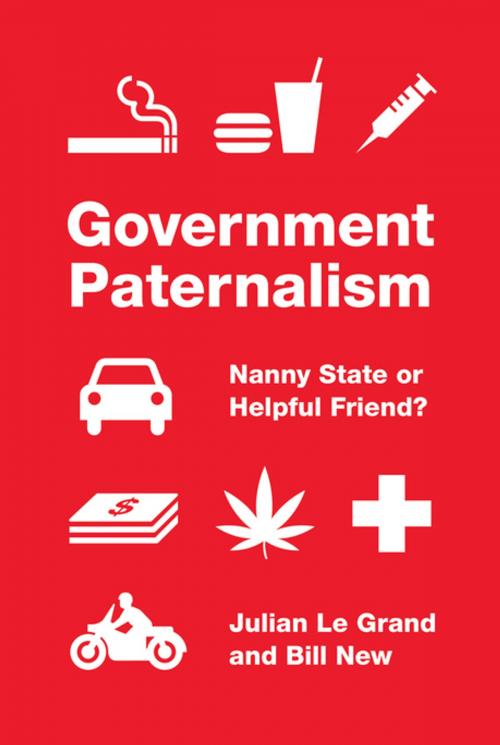Government Paternalism
Nanny State or Helpful Friend?
Nonfiction, Social & Cultural Studies, Political Science, Government, Social Policy, Politics, History & Theory, Religion & Spirituality, Philosophy| Author: | Julian Le Grand, Bill New | ISBN: | 9781400866298 |
| Publisher: | Princeton University Press | Publication: | January 25, 2015 |
| Imprint: | Princeton University Press | Language: | English |
| Author: | Julian Le Grand, Bill New |
| ISBN: | 9781400866298 |
| Publisher: | Princeton University Press |
| Publication: | January 25, 2015 |
| Imprint: | Princeton University Press |
| Language: | English |
Should governments save people from themselves? Do governments have the right to influence citizens' behavior related to smoking tobacco, eating too much, not saving enough, drinking alcohol, or taking marijuana—or does this create a nanny state, leading to infantilization, demotivation, and breaches in individual autonomy? Looking at examples from both sides of the Atlantic and around the world, Government Paternalism examines the justifications for, and the prevalence of, government involvement and considers when intervention might or might not be acceptable. Building on developments in philosophy, behavioral economics, and psychology, Julian Le Grand and Bill New explore the roles, boundaries, and responsibilities of the government and its citizens.
Le Grand and New investigate specific policy areas, including smoking, saving for pensions, and assisted suicide. They discuss legal restrictions on risky behavior, taxation of harmful activities, and subsidies for beneficial activities. And they pay particular attention to "nudge" or libertarian paternalist proposals that try to change the context in which individuals make decisions so that they make the right ones. Le Grand and New argue that individuals often display "reasoning failure": an inability to achieve the ends that they set themselves. Such instances are ideal for paternalistic interventions—for though such interventions might impinge on autonomy, the impact can be outweighed by an improvement in well-being.
Government Paternalism rigorously considers whether the state should guide citizen decision making in positive ways and if so, how this should be achieved.
Should governments save people from themselves? Do governments have the right to influence citizens' behavior related to smoking tobacco, eating too much, not saving enough, drinking alcohol, or taking marijuana—or does this create a nanny state, leading to infantilization, demotivation, and breaches in individual autonomy? Looking at examples from both sides of the Atlantic and around the world, Government Paternalism examines the justifications for, and the prevalence of, government involvement and considers when intervention might or might not be acceptable. Building on developments in philosophy, behavioral economics, and psychology, Julian Le Grand and Bill New explore the roles, boundaries, and responsibilities of the government and its citizens.
Le Grand and New investigate specific policy areas, including smoking, saving for pensions, and assisted suicide. They discuss legal restrictions on risky behavior, taxation of harmful activities, and subsidies for beneficial activities. And they pay particular attention to "nudge" or libertarian paternalist proposals that try to change the context in which individuals make decisions so that they make the right ones. Le Grand and New argue that individuals often display "reasoning failure": an inability to achieve the ends that they set themselves. Such instances are ideal for paternalistic interventions—for though such interventions might impinge on autonomy, the impact can be outweighed by an improvement in well-being.
Government Paternalism rigorously considers whether the state should guide citizen decision making in positive ways and if so, how this should be achieved.















